Ever wondered why people in Mediterranean countries stay so healthy and live long? The answer might be in your local grocery store.
The Mediterranean diet is more than just a trend. It’s a proven way to eat that focuses on whole, unprocessed foods. This list shows you the key ingredients that make it so good for you.
Imagine eating in a way that’s not restrictive but joyful. The Mediterranean diet is all about fresh, colorful foods. These foods are packed with nutrients and can help prevent chronic diseases.
Looking to boost your heart health, manage your weight, or just enjoy better meals? This guide will help you stock up on Mediterranean diet essentials. They’re easy to find and super tasty.
Get ready to discover 30 amazing foods that can change how you eat and maybe even your life.
Understanding the Mediterranean Diet Basics
The Mediterranean diet is more than a meal plan. It’s a tasty journey into heart-healthy recipes that have fed generations. It comes from the cooking traditions of countries near the Mediterranean Sea. This diet offers more than just food.
Picture a traditional Mediterranean meal plan filled with fresh ingredients and vibrant flavors. It’s not just about eating. It’s a way of life that links food, culture, and health in amazing ways.
Origins of the Diet
The Mediterranean diet started with the eating habits of Greece, Italy, and Spain. People in these areas naturally ate:
- Fresh fruits and vegetables
- Whole grains
- Lean proteins
- Healthy fats like olive oil
Key Health Benefits
Studies show that this diet can:
- Lower heart disease risk
- Boost brain health
- Help keep a healthy weight
- Reduce inflammation
Core Eating Principles
The Mediterranean diet focuses on:
- Plant-based foods as primary nutrition
- Olive oil as the main fat source
- Enjoying meals with family and friends
- Moderate wine consumption
By following these principles, you’re not just eating. You’re adopting a proven way to nourish your body and enjoy life.
Essential Mediterranean Fruits and Vegetables
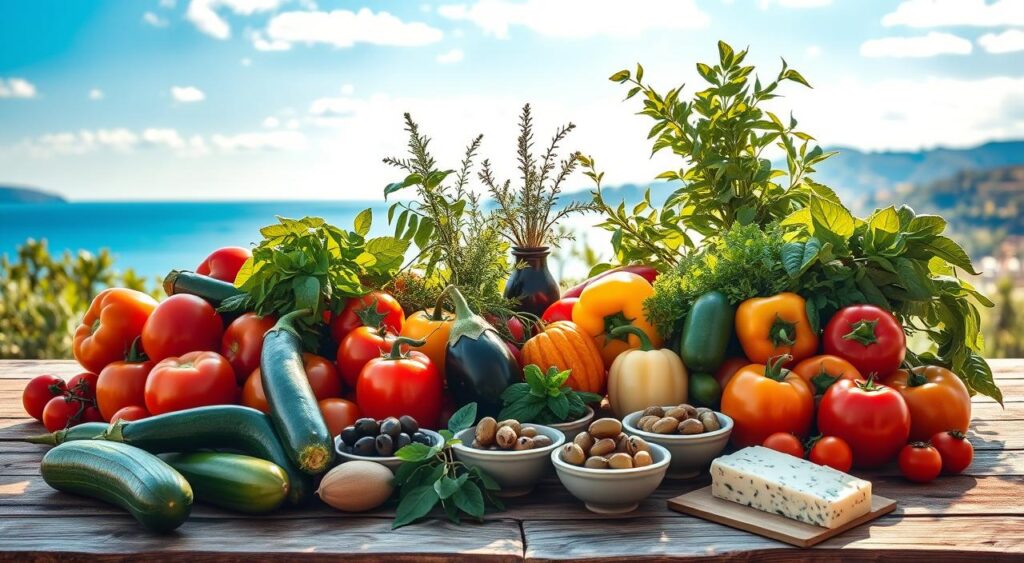
The Mediterranean diet is all about a wide variety of fruits and vegetables. These foods are key to eating healthy. They make your meals colorful and boost your health.
Mediterranean fruits and vegetables are more than just sides. They’re the main attraction. Experts say to eat at least 5 servings of veggies and 2-3 servings of fruit. This way, you get lots of nutrients and flavor.
- Leafy Greens: Spinach, kale, and Swiss chard
- Colorful Vegetables: Bell peppers, tomatoes, eggplant
- Citrus Fruits: Oranges, lemons, grapefruits
- Berries: Strawberries, blueberries, raspberries
The key to the Mediterranean diet is variety and freshness. Each fruit and veg has special nutrients. Tomatoes have lycopene, leafy greens have iron and calcium, and citrus fruits have vitamin C and antioxidants.
| Vegetable/Fruit | Key Nutrients | Health Benefits |
|---|---|---|
| Tomatoes | Lycopene, Vitamin C | Heart health, Cancer prevention |
| Spinach | Iron, Calcium, Magnesium | Bone strength, Muscle function |
| Oranges | Vitamin C, Fiber | Immune support, Digestion |
Try to eat seasonal, locally grown produce. Choosing fresh Mediterranean fruits and vegetables is like giving your body a gift. You’re feeding it with nature’s best.
The Role of Extra Virgin Olive Oil in Mediterranean Cooking
Extra virgin olive oil (EVOO) is a key part of Mediterranean cooking. It makes simple dishes into nutritional powerhouses. Your kitchen will greatly benefit from this golden liquid, adding flavor and health benefits.
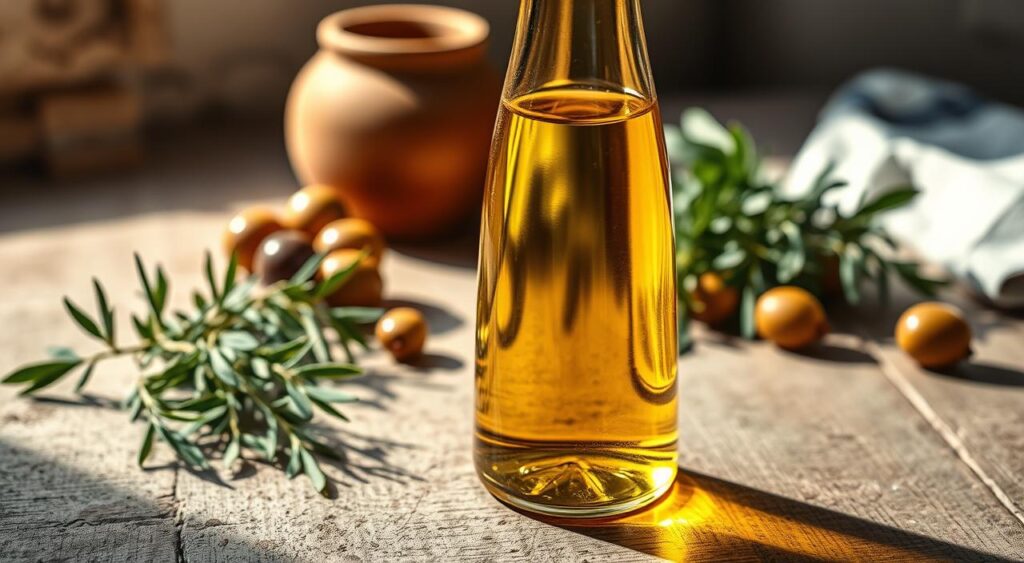
Greek olive oil does more than just cook food. It’s full of antioxidants and heart-healthy compounds. Studies show it can reduce inflammation and protect your heart.
Health Benefits of EVOO
- Reduces risk of heart disease
- Supports brain health
- Provides powerful antioxidant protection
- Helps manage blood sugar levels
Buying and Storage Tips
When picking EVOO, look for these signs:
| Quality Indicator | What to Look For |
|---|---|
| Color | Deep green to golden yellow |
| Origin | Preferably from Greece or Italy |
| Storage | Dark glass bottle, cool dark place |
Cooking Applications
Your EVOO can be used in many ways. Drizzle it over salads, use for low-heat cooking, or as a finishing touch on roasted vegetables. The key is to keep its flavor and nutrients intact.
Adding extra virgin olive oil to your diet can change how you eat. It’s a tasty way to improve your nutrition and health.
Whole Grains and Legumes: Mediterranean Diet Foods List
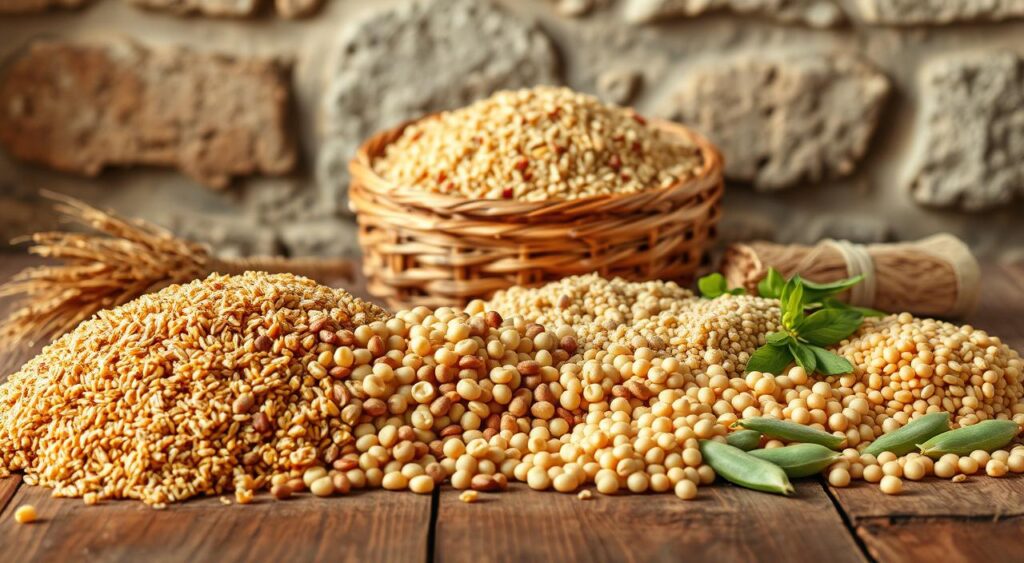
Exploring whole grains in Mediterranean cuisine opens up a world of tasty and healthy foods. These foods are key to Mediterranean eating. They offer both flavor and health benefits.
Whole grains are essential in Mediterranean eating. They give you important nutrients, complex carbs, and lasting energy. Let’s look at some popular whole grains you can add to your meals:
- Quinoa – a protein-rich pseudo-grain
- Bulgur wheat – quick-cooking and versatile
- Barley – with its nutty flavor and chewy texture
- Brown rice – a classic whole grain option
- Farro – an ancient wheat variety
Legumes bring a wealth of nutritional benefits. Chickpeas, lentils, and white beans are key in Mediterranean cooking. They offer plant-based protein, fiber, and essential minerals. These foods help keep blood sugar steady and support heart health.
Pro tip: Mix whole grains and legumes in salads, soups, and main dishes. This creates balanced, satisfying meals that follow Mediterranean diet principles.
Make your kitchen a Mediterranean nutrition hub by stocking up on these staples. Try out different whole grains and legumes. You’ll find tasty ways to nourish your body and please your taste buds.
Fresh and Dried Herbs for Mediterranean Flavors
Herbs are the secret to Mediterranean cooking, turning simple dishes into vibrant meals. They add amazing flavor and health benefits without extra calories or salt.
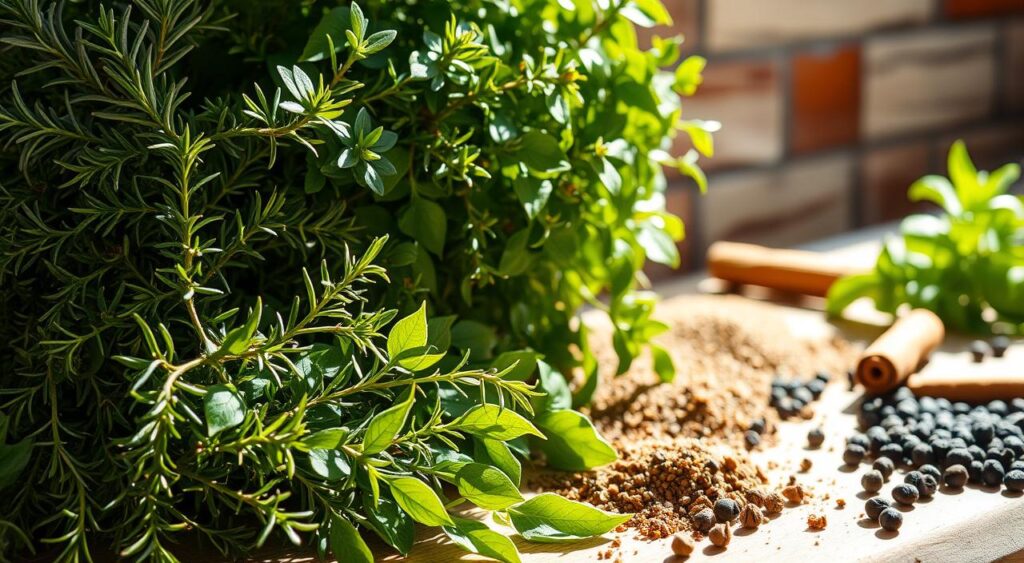
Mediterranean cuisine sees herbs as more than just flavor enhancers. They’re full of antioxidants and healing properties. This makes every bite both tasty and good for you.
Must-Have Mediterranean Herbs
- Basil: Sweet and peppery, perfect for tomato dishes
- Oregano: Robust flavor ideal for grilled meats and vegetables
- Rosemary: Woody and aromatic, great for roasted dishes
- Thyme: Earthy and versatile for multiple recipes
- Mint: Refreshing addition to salads and beverages
Spice Blends and Combinations
Authentic Mediterranean flavors come from special spice mixes. Za’atar and herbes de Provence are two classic blends that can make your dishes pop.
| Spice Blend | Key Ingredients | Best Used With |
|---|---|---|
| Za’atar | Dried herbs, sesame seeds, sumac | Breads, grilled meats, vegetables |
| Herbes de Provence | Thyme, basil, rosemary, oregano | Roasted chicken, fish, soups |
Storage and Usage Tips
To keep herbs fresh, store dried ones in airtight containers away from sunlight. Fresh herbs should be wrapped in damp paper towels and kept in the fridge. Use them freely – they’re the secret to Mediterranean magic in your kitchen!
Nuts and Seeds: Heart-Healthy Mediterranean Staples
Mediterranean nuts and seeds are packed with nutrients. They are tiny but offer big health benefits. They are key to a Mediterranean diet.
Looking to improve your health? Nuts and seeds are a great start. Almonds, walnuts, pistachios, and pumpkin seeds are full of good stuff for your heart. A Mediterranean diet grocery list always has these.
- Almonds: Rich in vitamin E and magnesium
- Walnuts: Packed with omega-3 fatty acids
- Pistachios: High in protein and antioxidants
- Sunflower seeds: Excellent source of selenium
Adding nuts and seeds to your meals is easy. Sprinkle them on salads, blend into smoothies, or snack on them. Moderation is key – a small handful a day is enough.
Your heart will love these foods. They help fight inflammation and support brain health. Nuts and seeds make healthy eating tasty and fun.
Fish and Seafood Choices in Mediterranean Cuisine
Seafood is key in the Mediterranean diet, adding flavor and health benefits. It’s a main part of healthy eating, giving important nutrients for well-being.
The Mediterranean offers a wide range of fish and seafood. These can make your meals both tasty and nutritious. Adding them to your diet can greatly improve your health.
Best Fish Options for Omega-3s
Choosing the right fish is important for health. Here are some top choices for omega-3s:
- Sardines
- Salmon
- Mackerel
- Anchovies
- Herring
Seafood Serving Recommendations
Experts say to eat fish at least twice a week for health benefits. The Mediterranean diet suggests making fish a main protein source.
| Fish Type | Omega-3 Content | Recommended Servings |
|---|---|---|
| Salmon | High | 2-3 servings/week |
| Sardines | Very High | 1-2 servings/week |
| Mackerel | High | 1-2 servings/week |
Shopping and Selection Guidelines
When picking fish for Mediterranean meals, choose fresh and sustainable options. Look for clear eyes, firm flesh, and a mild smell. Wild-caught fish usually has better nutrition than farmed ones.
“Fresh fish is the heart of Mediterranean cuisine” – Mediterranean Culinary Experts
Adding fish to your Mediterranean diet can boost your nutrition and health. It’s a great way to support your long-term health goals.
Mediterranean Dairy Products and Cheeses
Dairy in the Mediterranean diet is special and enjoyable. Unlike Western diets, it uses dairy with balance and care. Yogurt and cheese are key parts of this diet, making it good for your heart.
Greek yogurt is a big hit in the Mediterranean diet. It’s full of probiotics and protein, making it versatile. You can eat it alone, use it in dips, or add it to many dishes.
- Feta cheese: A tangy, crumbly cheese perfect for salads
- Halloumi: A grilling cheese with unique texture
- Parmigiano-Reggiano: A rich, aged cheese for flavor enhancement
Choose high-quality dairy products over quantity. Go for full-fat, less processed options for better nutrition. Enjoy these Mediterranean dairy treats in small amounts, fitting them into a mostly plant-based diet.
The Mediterranean approach to dairy is about savoring flavor while maintaining nutritional balance.
Be mindful of your dairy intake. A little cheese or yogurt can add a lot of nutrition without overloading your diet. It’s all about balance, not too much.
Lean Proteins and Poultry Options
The traditional Mediterranean meal plan focuses on lean proteins. These foods are good for your body without being too heavy. Chicken, eggs, and some lean meats are key parts of this diet.
Chicken and turkey are top protein choices in the Mediterranean diet. They give you important nutrients and keep your meals light. Unlike diets that focus too much on meat, the Mediterranean diet sees proteins as a supporting role.
Smart Protein Portion Guidelines
Knowing how much protein to eat is important. Here are some guidelines:
- Chicken or turkey: 3-4 ounces per serving
- Eggs: 1-2 per day
- Lean meats: Small portions, 1-2 times weekly
Healthy Preparation Techniques
When cooking your Mediterranean meals, use methods that keep nutrients and flavor:
- Grilling with minimal oil
- Roasting with herbs and spices
- Poaching for tender, low-fat results
- Baking with olive oil and fresh herbs
Choose high-quality, unprocessed proteins. Cook them in ways that boost taste and nutrition.
Traditional Mediterranean Condiments and Sauces
Boost your mediterranean diet with traditional condiments that add flavor and nutrition. These gems turn simple meals into special moments. They bring the Mediterranean’s essence to your kitchen.
Mediterranean condiments do more than add taste. They stand for a rich tradition of using fresh, whole foods and healthy cooking methods.
- Hummus: A creamy chickpea-based dip packed with protein
- Tzatziki: A cooling yogurt and cucumber sauce
- Pesto: A vibrant herb and olive oil blend
- Tapenade: An olive-based spread rich in healthy fats
These condiments are incredibly versatile. They’re great as:
- Dips for fresh vegetables
- Spreads for whole grain breads
- Marinades for lean proteins
- Salad dressing alternatives
The charm of these sauces is their simplicity. Most can be made quickly with just a few ingredients. They’re ideal for those who care about their health and cooking.
| Condiment | Key Ingredients | Health Benefits |
|---|---|---|
| Hummus | Chickpeas, Tahini, Olive Oil | High Protein, Heart-Healthy Fats |
| Tzatziki | Greek Yogurt, Cucumber, Garlic | Probiotics, Low Calorie |
| Pesto | Basil, Olive Oil, Pine Nuts | Antioxidant-Rich, Anti-Inflammatory |
Adding these Mediterranean condiments to your diet boosts flavor and health. It’s a vibrant way to eat.
Conclusion
Your journey through the Mediterranean diet foods list shows a tasty way to eat healthy. It includes colorful fruits and veggies, healthy olive oil, and lean proteins. This diet is more than just food; it’s a lifestyle that boosts your overall health.
Making heart-healthy Mediterranean recipes is easy and doesn’t need fancy cooking skills or expensive stuff. You can find most of these foods at your local grocery store. This makes it easy for anyone to start eating better.
By adding Mediterranean diet foods to your meals, you’ll find a lasting way to eat. Each food helps your health, from fighting inflammation to keeping your heart healthy. Start by replacing junk snacks with nuts, eating more fish, and trying new herbs and olive oil.
Choosing to follow this healthy eating path can change how you see food. The Mediterranean diet is not just about what you eat. It’s about enjoying fresh foods, sharing meals with family, and caring for your health with every bite.

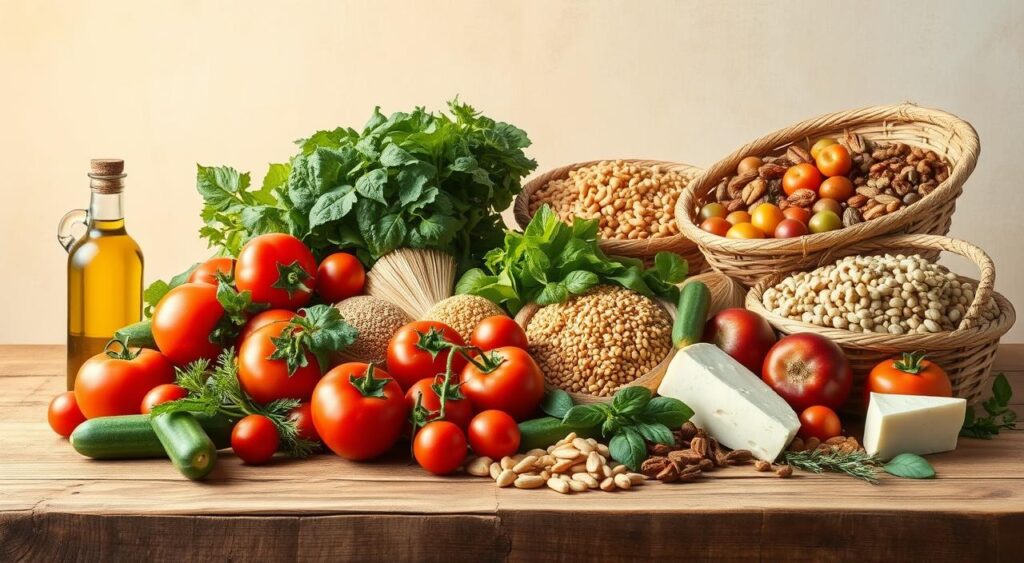
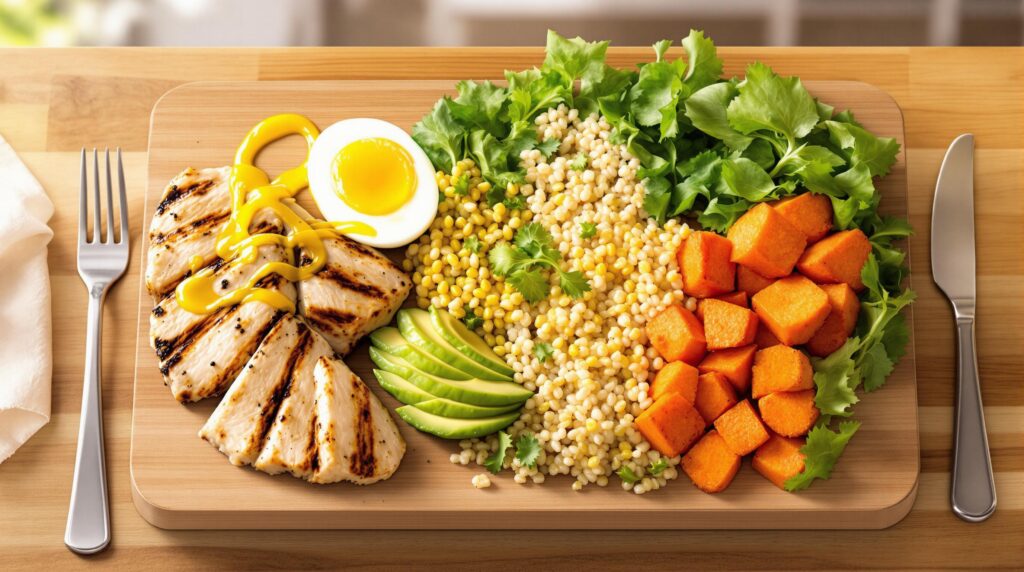

Pingback: Mediterranean Diet: Starter Guide + 3-Day Menu